Why is My Cat Sneezing: Veterinary Advice for Your Cat
Most cat owners know that sneezing is common in cats. However, if your fur baby has recently started sneezing frequently, it could be more than just a regular sneeze.
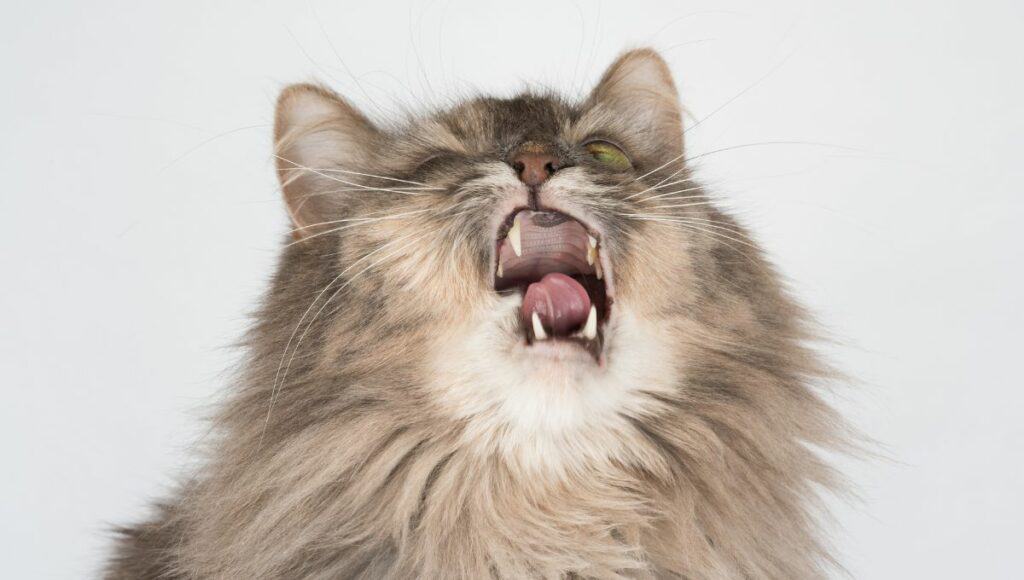
There are various reasons for sneezing, including respiratory infections and dental issues. But how do you know why your cat is sneezing? When is sneezing normal and when is it a medical problem?
Your cat may be sneezing due to common irritants like dust, strong scents, or allergens. However, frequent sneezing can also signal a respiratory infection, dental issues, or a more serious condition that warrants a vet visit.
This article will explore the causes of cat sneezing, help you recognize when it’s necessary to visit the vet, and provide holistic tips to prevent sneezing in cats.
Why is My Cat Sneezing: Understanding the Causes
Cat sneezing is a common occurrence. Similar to humans, cats sneeze as a response to an irritation in the nasal passages.
A sneeze is a reflex action where the body forcefully and suddenly expels air through the mouth and nose. It happens involuntarily to clear the airways of irritants and protect the respiratory system.
Sometimes, the cause is foreign material, such as dust or pollen that the cat has inhaled that has irritated the sensitive lining of the cat’s nose.
If the cat also happens to be allergic to this material, it will cause an immune reaction that results in sneezing and other allergy symptoms.
Infections can also cause cats to sneeze. Similar to humans, cats can develop colds, which are upper respiratory infections that can cause frequent sneezing due to inflammation and congestion in their sinuses.
Other less common reasons for cat sneezing include nasal tumors and even dental issues.
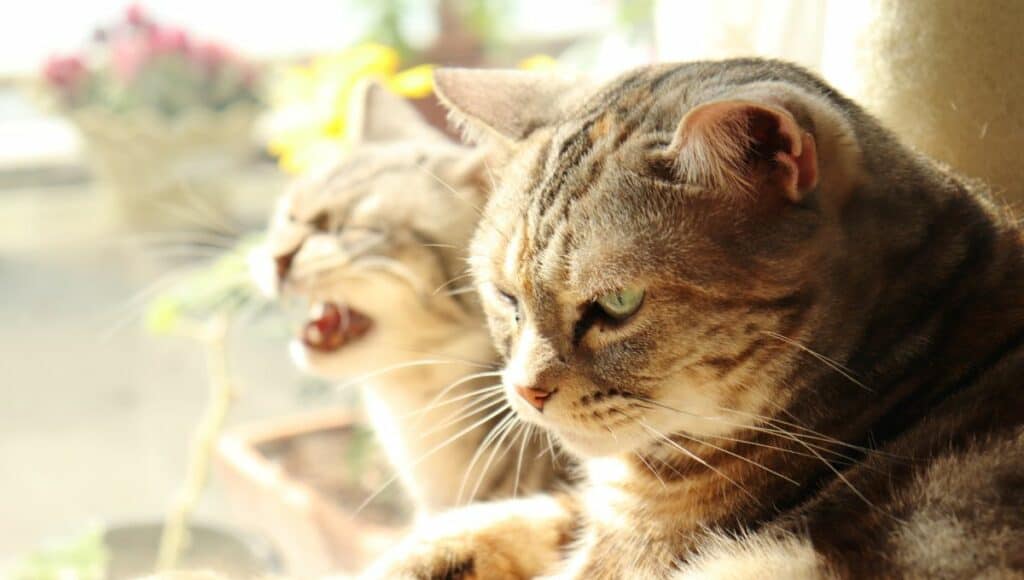
Is My Cat’s Sneezing Normal?
But how are cat owners to know when their pet is sneezing normally and when it is a sign of something more serious? This is where understanding the different types of cat sneezing and what else to look for becomes important.
Frequency of Sneezing
The first step in determining if the sneezing is abnormal is to observe your cat’s sneezing patterns.
How often do you notice your cat sneezing? An occasional sneeze is likely nothing to worry about. However, if your cat is sneezing a lot (multiple times an hour or sneezing that is regular and persistent over days ), this could be a sign of a more serious issue.
Abnormal sneezing frequency can serve as an essential indicator of potential health issues. While the odd sneeze here and there is normal, frequent and persistent sneezing can signal an underlying problem.
A cat that is sneezing multiple times in quick succession, often termed “sneezing fits,” can indicate issues like upper respiratory infections, allergies, irritants, or even foreign objects in the nasal passages.
An occasional sneezing fit may be nothing to worry about if it is not ongoing and repetitive. However, if your cat is experiencing frequent and persistent sneezing fits, it may be time to take a closer look at their health.
Other Symptoms to Look for
In addition to observing the frequency of sneezing, it helps to look for other symptoms that may accompany it. The presence of these additional symptoms could indicate a more serious issue.
Some common symptoms of illness to look for include:
- Watery or discolored discharge from the nose or eyes
- Difficulty breathing
- Loss of appetite
- Lethargy and lack of energy
- Rubbing or pawing at their nose
The presence of any of these symptoms in your cat can give you additional information about the underlying cause of its sneezing. If you notice any of these symptoms, it is very likely that something is amiss.
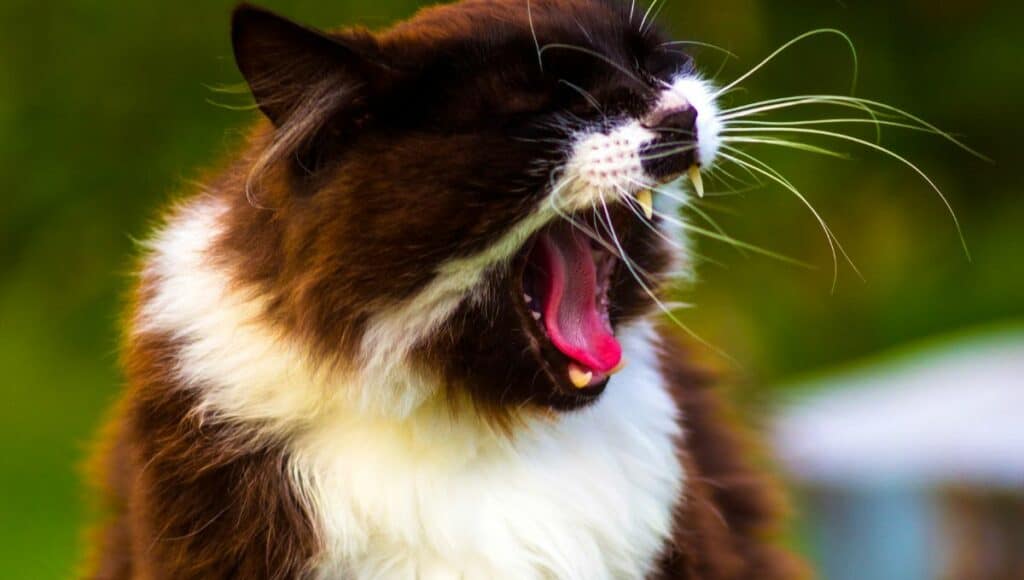
Causes of Sneezing in Cats
There are multiple possible reasons why your cat is sneezing, with some reasons being more common than others. Some of the most common are:
Upper Respiratory Infections
Upper Respiratory Infections (URIs) are a common cause of sneezing in cats. Either viruses or bacteria can cause them. Outdoor cats that come in regular contact with other cats are more prone to getting URIs, particularly if they are not vaccinated.
Viral Infections
Cats’ most common viruses causing URIs are feline herpesvirus (FHV-1) and feline calicivirus (FCV). These infections are highly contagious and typically spread through close contact.
Symptoms of viral URIs may include:
- Sneezing
- Nasal Discharge
- Watery Eyes
- Coughing
- Lethargy
- Reduced Appetite
While there is no cure for viral URIs, treatment focuses on managing symptoms and supporting the cat’s immune system. Veterinarians may recommend antiviral medications in severe cases.
At-home supportive care includes making sure your cat stays well-hydrated and has a stress-free environment to aid recovery. Good nutrition and proper care are important for helping your cat fight off the infection.
Bacterial Infections
Bacteria can also cause URIs in cats. These infections are less common but tend to be more severe than viral URIs.
Bacterial URIs are typically caused by pathogens like Bordetella bronchiseptica and Chlamydia felis.
Viral URIs damage the respiratory system and not only cause the cat to sneeze, but make the cat more susceptible to getting a bacterial infection. Consequently, bacterial infections often occur in combination with viral URIs, leading to more severe symptoms.
Symptoms of bacterial URIs may include:
- Sneezing: Frequent and persistent sneezing, similar to viral URIs.
- Purulent Nasal Discharge: Thick, yellow or green mucus coming from the nose.
- Conjunctivitis: Eye inflammation and discharge may occur.
- Coughing: Coughing may be more pronounced in bacterial infections.
- Lethargy: Cats may feel weak and uninterested in food.
Bacterial URIs often require antibiotic treatment, in addition to supportive care. It’s essential to complete the full course of antibiotics to prevent recurrence or the development of an antibiotic-resistant infection.
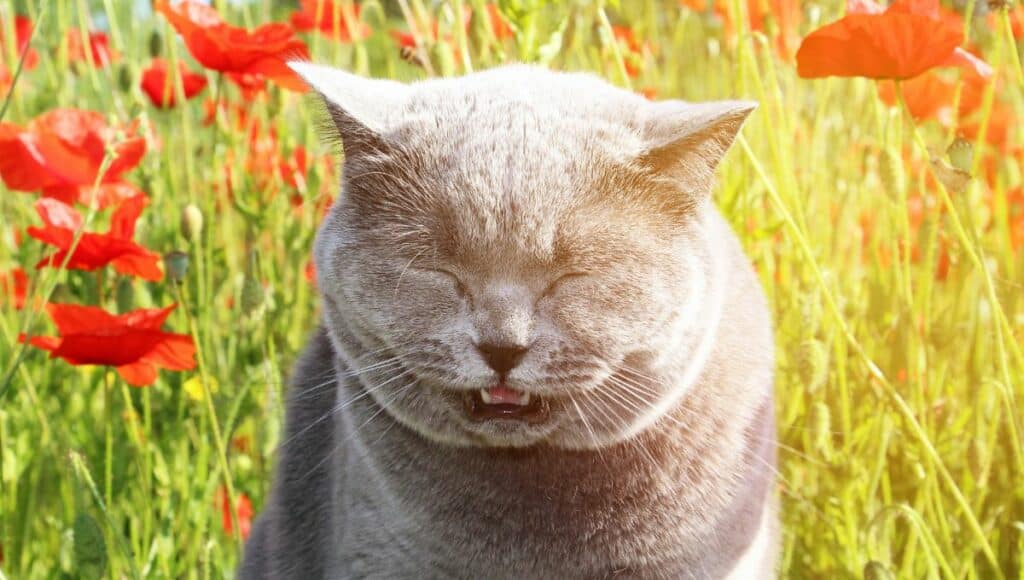
Allergies
Allergies in cats, like in humans, are driven by the immune system’s overreaction to substances that are typically harmless.
When a cat with allergies encounters an allergen, their immune system goes on high alert, leading to a cascade of responses.
Sneezing, coughing, and wheezing are some of the most noticeable signs of allergies in cats, especially when it involves an inhaled allergen. Other signs that your cat has an allergy include:
- Runny nose: Allergies will often lead to a clear, watery discharge from the nose.
- Itching and Scratching: Cats with allergies may excessively scratch their skin, especially around the face and neck. They may also chew or lick their paws.
- Skin Irritation: Allergies can lead to redness, hives, and even hair loss in cats.
- Digestive Issues: Some cats may experience gastrointestinal problems such as diarrhea or vomiting due to allergies.
Common Allergens and Their Sources
Different allergens can cause cats to have allergic reactions, and identifying the source is critical for managing their symptoms. Common allergens include:
- Pollen: Pollen from grasses, trees, and flowers is a common allergen. Although pollen is found outdoors, cats can bring it inside on their fur and paws.
- Dust Mites: These tiny creatures thrive in household dust, upholstery, and bedding. Cats can be exposed to them during their everyday activities.
- Mold Spores: Mold can grow in damp areas of your home, and the spores can become airborne, which can cause allergies in cats.
- Household Chemicals: Cleaning products, air fresheners, perfumes, and other chemicals can irritate the respiratory system.
- Foods: Food allergies can lead to sneezing in some cats, although other symptoms such as itching or digestive system upset are more common.
- Insect Bites: Flea saliva is a common allergen in cats, and reactions may include itching, sneezing, and skin irritations.
Knowing where these allergens come from can help cat owners minimize exposure. Regular cleaning, keeping a dust-free environment, and using hypoallergenic products can help reduce the impact of common allergens.
Foreign Body
Cats, with their inquisitive nature, can sometimes come into contact with tiny foreign objects like dust, grass, or other small items. These objects may find their way into their nose, triggering a natural response—sneezing.
When a foreign object enters the nasal passages, it can irritate the sensitive lining, prompting a sneeze as a protective mechanism. Sneezing is the body’s attempt to expel the foreign intruder from its nose.
If you suspect your cat has a foreign object lodged in its nose, avoid attempting to remove the object yourself. The nasal passages are delicate, and trying to remove a foreign object without proper knowledge or equipment can lead to further injury.
The best approach is to reach out to your vet immediately. They will conduct a thorough examination, possibly using specialized equipment like endoscopy, to visualize and safely remove the foreign object.
Depending on the nature and location of the foreign object, your veterinarian will recommend an appropriate course of action. This may involve sedation, surgical removal, or other procedures to ensure the object is safely extracted
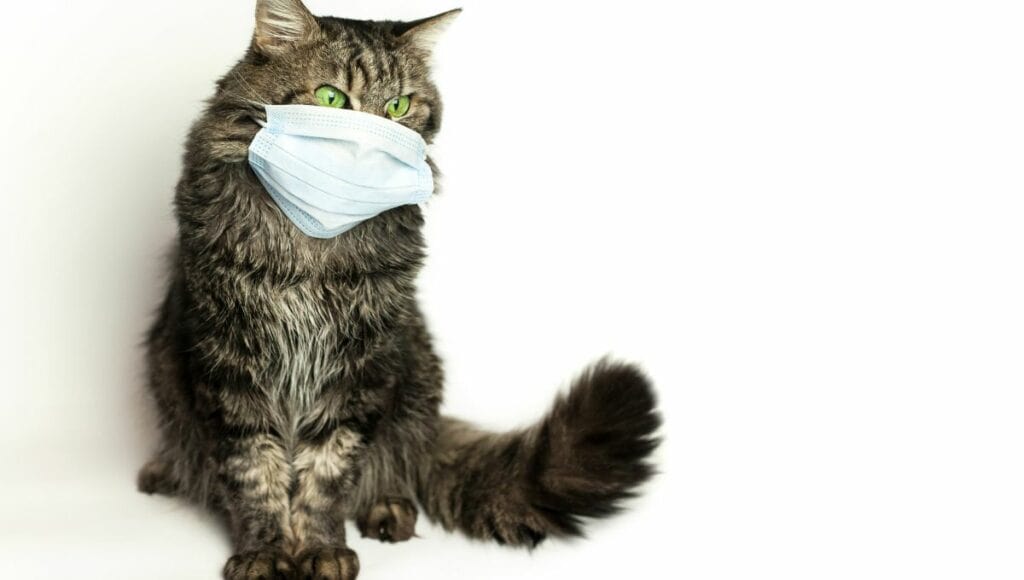
Nasal Tumors and Polyps
Nasal tumors and nasal polyps can cause sneezing through physical obstruction and irritation of the nasal passages.
These tumors can block the normal airflow through the nose, leading to increased mucus production and inflammation. As a result, sneezing occurs as the body attempts to clear the airway of the irritants caused by the tumor.
Other common symptoms of nasal tumors in cats include discharge from the nose, breathing difficulties, and changes in voice or vocalization.
Although not common, nasal tumors can be serious and require prompt examination and treatment by a veterinarian, which may include surgery, radiation therapy, or other interventions.
Dental Problems
Dental disease can indirectly be the cause of sneezing in cats. When a cat has dental problems like infected teeth or gum disease, it can create an infection and inflammation near the nasal passages.
The closeness of these structures means that infections can spread to the sinuses, leading to sneezing as the body tries to clear the irritation. Cats with dental disease may also drool, which is a symptom that is not seen with most other causes of sneezing.
Cats with dental issues should receive medical care to prevent further complications and relieve pain and discomfort.
Fungal Infections
Nasal fungal infections in cats are not as common as other types of infections, but they can still occur.
When a cat shows chronic or severe respiratory symptoms like sneezing, green or yellow mucus coming from the nose, and coughing, a fungal infection should be considered as a possible cause.
Fungal infections are often treated with antifungal medication and supportive care, and prompt treatment is essential to prevent the infection from spreading and causing further damage.
When Do You Need to Take Your Sneezing Cat to the Vet?
While occasional sneezing is usually not a cause for concern, knowing when it’s time to seek veterinary care is essential.
Some factors that can help you decide if you need to take your cat to the vet include:
- Frequency: Occasional sneezes are usually nothing to worry about. However, repeated and persistent sneezing could indicate an underlying issue.
- Duration: Sneezing that persists for more than a day or two may require medical attention.
- Difficulty Breathing: Difficulty breathing is a medical emergency that can be life-threatening. Cats that are having difficulty breathing need to be taken to the vet immediately.
- Nasal Discharge: A watery nose is not something to worry about so long as your cat is otherwise healthy. If sneezing is accompanied by green, yellow, or bloody mucus coming from the nose, seek veterinary care immediately as it could indicate a more severe problem.
- Changes in Appetite or Energy Levels: A cat that suddenly loses its appetite or becomes lethargic along with sneezing may be experiencing an underlying issue that requires medical attention.
- Vaccination Status: Cats that have not had a vaccine for URIs or are overdue for vaccinations should see a vet if they start sneezing. Sneezing can be a sign of an infectious disease, and unvaccinated cats are at a higher risk.
- Chronic Conditions: Cats with pre-existing conditions like allergies or respiratory problems should receive prompt veterinary care if they start sneezing. These conditions can worsen quickly if left untreated, and early intervention is key to managing them effectively.
When in doubt, it’s always best to err on the side of caution and consult with a veterinarian if you’re concerned about your cat’s sneezing. Acting quickly can help identify any underlying issues and provide prompt treatment for your feline friend.
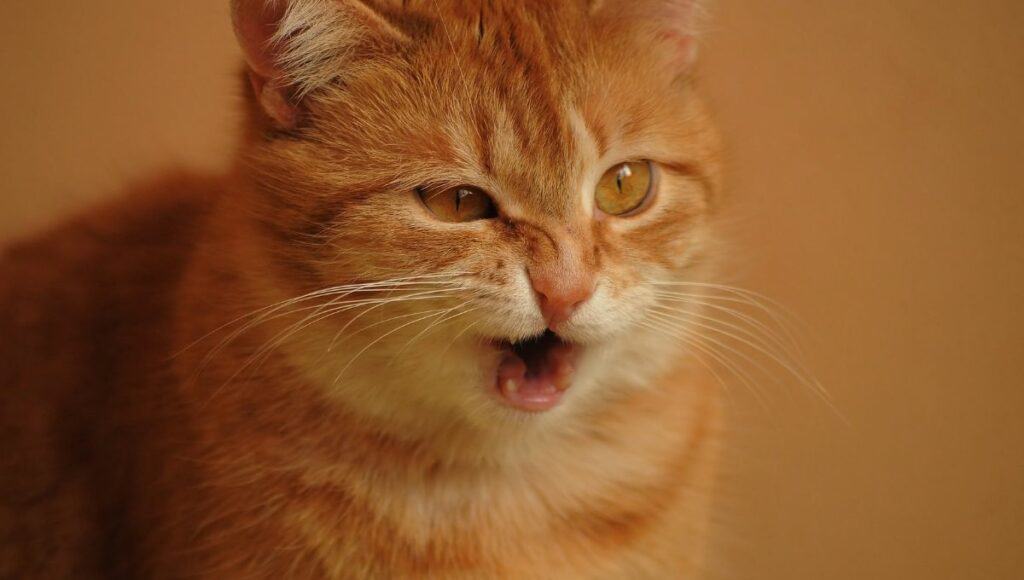
Preventing Sneezing in Cats: A Holistic Approach
The best way to prevent sneezing in cats is to vaccinate them against URIs. Infections caused by feline herpesvirus and calicivirus can be easily prevented through regular vaccinations.
Consult your veterinarian to establish a vaccination schedule tailored to your cat’s specific needs, age, and lifestyle.
For cats with allergies, it’s important to manage allergens. Identify common allergens such as pollen, dust mites, and mold. Use unscented and dust-free cat litter to minimize respiratory irritants.
Keep your pet’s living area clean to prevent exposure to common allergens like dust, pollen, or mold. And of course, consult your veterinarian in case medical management of their allergies is needed.
Regular vet check-ups help detect issues early, like infections or dental problems, that could cause sneezing. Your vet can provide preventative measures, vaccinations, and guidance for maintaining a clean living environment.
A Last Word on Cat Sneezing
In conclusion, while sneezing in cats may seem like a minor concern, staying alert and responsive to any changes in your pet’s behavior is important.
Taking a proactive approach that includes regular vaccinations, managing allergens, and seeking prompt veterinary care can greatly improve your cat’s quality of life.
Always remember to consult with your veterinarian if you have any concerns about your cat’s health, and together you can keep your feline friend happy and healthy.
Remember, our cats rely on us for their well-being. So the next time you hear your cat sneeze, don’t ignore it – pay attention and take action when needed!
This article is for informational purposes only and is not intended to be a substitute for professional veterinary advice. If you have any concerns about your pet’s health, please consult with a licensed veterinarian.
